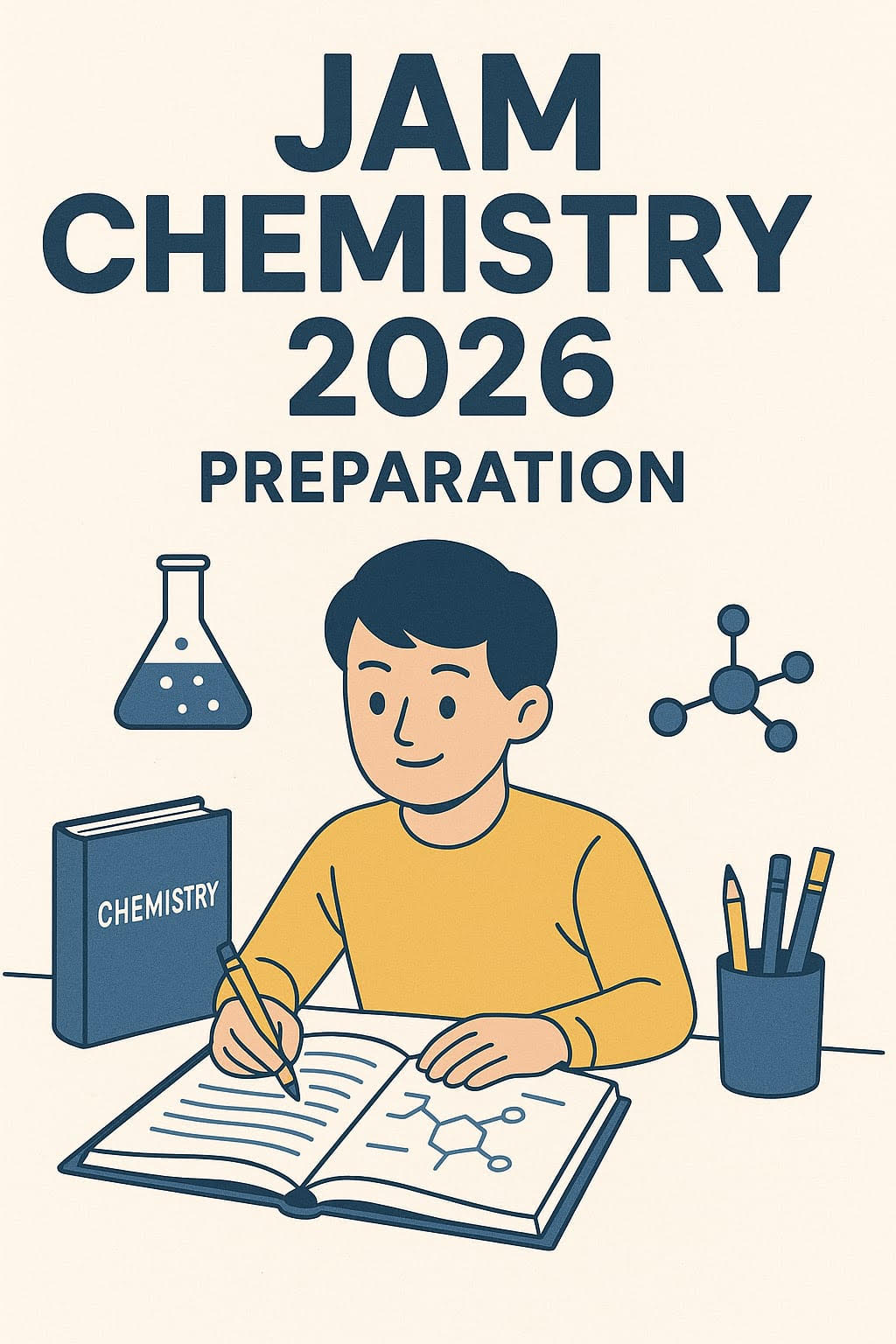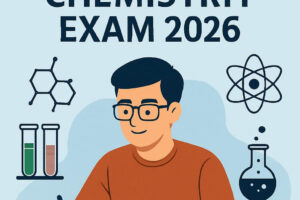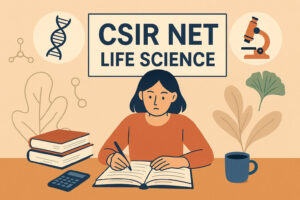
A Complete Beginner’s Guide (2026)
The IIT Joint Admission Test for M.Sc. (JAM) is one of the most prestigious national-level entrance exams for science graduates aiming to pursue post-graduate programs such as M.Sc., Joint M.Sc.-Ph.D., and integrated Ph.D. at leading institutes like IITs, IISc, NITs, and IISERs. Among various subjects, JAM Chemistry (CY) remains one of the most competitive and rewarding fields for aspirants.
If you’re beginning your JAM Chemistry preparation from scratch, this complete guide for the 2026 exam will walk you through everything you need to know — from exam pattern and syllabus to preparation strategies, study materials, and expert tips.
Understanding IIT JAM Chemistry 2026: Overview
Before diving into preparation, it’s essential to understand the structure and nature of the exam.
Exam Mode and Format
Mode: Online Computer-Based Test (CBT)
Duration: 3 hours
Total Marks: 100
Number of Questions: 60
Medium: English
Section-wise Distribution:
Section Type of Questions Number of Questions Marks
A Multiple Choice (MCQ) 30 50
B Multiple Select (MSQ) 10 20
C Numerical Answer (NAT) 20 30
Marking Scheme:
MCQ: +1/+2 for correct, -1/3 or -2/3 for incorrect (for 1-mark/2-mark questions)
MSQ/NAT: No negative marking
IIT JAM Chemistry 2026 Syllabus
The syllabus is divided broadly into three main sections:
1. Physical Chemistry
Atomic Structure and Quantum Chemistry
Chemical Thermodynamics
Chemical Kinetics
Electrochemistry
Surface Chemistry
Solutions and Colligative Properties
Gaseous and Liquid States
Solid State
2. Organic Chemistry
Reaction Mechanisms and Reactive Intermediates
Stereochemistry
Aromaticity
Named Reactions
Biomolecules
Polymers
Spectroscopy: UV, IR, NMR
3. Inorganic Chemistry
Periodic Table and Periodicity
Chemical Bonding
Coordination Chemistry
Main Group Elements
Transition and Inner-Transition Elements
Organometallics
Bioinorganic Chemistry
Refer to the official IIT JAM 2026 syllabus PDF for detailed and updated topics.
Step 1: Analyze the Syllabus and Exam Pattern
Start by downloading the official syllabus from the IIT JAM website. Categorize topics into strong, moderate, and weak zones based on your existing knowledge. Identify high-weightage topics from previous year papers.
Step 2: Create a Realistic Study Plan
Divide your preparation time into phases:
Phase 1 (April – July): Concept building
Phase 2 (August – October): Advanced practice and topic tests
Phase 3 (November – January): Full-length mock tests, revision, PYQs
Ensure your weekly schedule includes:
5–6 study hours daily
Balanced focus on Physical, Organic, and Inorganic Chemistry
Weekly revisions and practice questions
Step 3: Build Strong Fundamentals
Use NCERT textbooks of Class 11 and 12 to strengthen your basics in Physical, Organic, and Inorganic Chemistry. Move on to advanced books only after gaining clarity in foundational concepts.
Topic-Wise Preparation Tips
Physical Chemistry:
Practice numerical problems daily
Focus on formulas and derivations
Understand graphs and data interpretation
Organic Chemistry:
Build reaction mechanisms from basics
Practice name reactions and conversions
Understand spectroscopy-based structural analysis
Inorganic Chemistry:
Memorize periodic trends and exceptions
Revise coordination chemistry regularly
Practice structure-based questions from bioinorganic chemistry
Importance of Solving Previous Year Papers
Solving PYQs helps you:
Understand JAM’s difficulty level
Familiarize with question types
Identify repetitive and high-weightage topics
Mock Tests and Self-Evaluation
Enroll in a test series or solve mock tests every weekend after your basics are clear. Mock tests simulate real exam pressure and help identify weaknesses.
Track:
Accuracy
Speed
Time taken per section
Negative marking instances
Revise your mistakes and make short notes of incorrect questions.
Tips for Working Students or Late Starters
Utilize weekends for long study sessions
Study in Pomodoro sessions (25+5 minute blocks)
Watch recorded video lectures instead of live
Focus on high-weightage chapters first
Revision Strategy
In the final 2 months:
Make one-page summaries for each chapter
Revise using flashcards and formula sheets
Re-solve difficult PYQs
Attempt 2–3 full-length mocks per week
Use revision tables and mind maps for topics like chemical bonding, reaction mechanisms, and spectroscopy.
Day Before the Exam
Stay calm and confident
Revise only key formulas and reaction mechanisms
Do not start any new topic
Ensure good sleep and nutrition
On the Exam Day
Attempt NAT questions carefully, as they carry no negative marking
Do not spend more than 60 seconds on any one question in the first pass
Mark doubtful questions for review
Maximize attempt in MSQs with logic and elimination
Common Mistakes to Avoid
Ignoring Inorganic Chemistry until the last moment
Rote learning without understanding mechanisms
Over-reliance on one resource
Skipping mock tests
Not analyzing previous year trends
IIT JAM Chemistry 2026: Month-by-Month Preparation Plan
Month Goals
April – May Syllabus analysis, basics from NCERT
June – July Physical & Inorganic Chemistry fundamentals
August Start Organic Chemistry, PYQ practice
September Full syllabus completion
October Topic-wise tests and notes making
November Begin full-length mocks and revisions
December Mock analysis, final revision
January Polishing weak areas, peak preparation
February Final touch-ups and confidence building
How GATEIIT Institute Helps in JAM Chemistry Preparation
GATEIIT (Bangalore) is a renowned coaching institute known for its focused JAM Chemistry preparation. Here’s how GATEIIT supports aspirants:
1. Structured Coaching Program
GATEIIT offers a well-organized course curriculum covering all aspects of JAM Chemistry, from basic to advanced topics, aligned with the latest syllabus.
2. Expert Faculty and Live Classes
The institute has experienced educators from IITs and IISc, delivering live interactive classes and one-on-one mentorship.
3. High-Quality Study Material
Students receive updated notes, formula sheets, and topic-wise problem sets designed specifically for JAM Chemistry.
4. Regular Tests and Assessments
The institute conducts frequent unit tests, topic tests, and full-length mocks, helping students track their progress and improve.
5. Doubt Clearing Sessions
Live doubt-clearing sessions and dedicated Telegram groups ensure that students never get stuck in any concept.
6. Online + Offline Flexibility
Whether you’re a final-year student or a working professional, GATEIIT provides flexible coaching options including recorded lectures, crash courses, and weekend batches.
7. Impressive Track Record
Every year, a significant number of GATEIIT students secure top ranks in JAM Chemistry, reflecting the institute’s quality and credibility.
Source link



